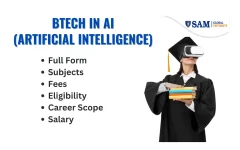What is Machine Learning: Syllabus, Admission, Fees, and Career Scope?
September 30, 2024 2025-03-24 4:59What is Machine Learning: Syllabus, Admission, Fees, and Career Scope?

What is Machine Learning: Syllabus, Admission, Fees, and Career Scope?
1. Introduction to Machine Learning
What is Machine Learning?
- Machine Learning (ML) is a branch of artificial intelligence (AI) that focuses on developing algorithms that allow computers to learn and make decisions based on data, without being explicitly programmed. ML is used in various industries, from healthcare and finance to marketing and technology.
- Examples: Self-driving cars, recommendation systems (Netflix, Amazon), fraud detection, etc.
2. Syllabus of Machine Learning
Core Subjects
- Introduction to Artificial Intelligence and Machine Learning
- Mathematics for Machine Learning: Linear Algebra, Probability, Statistics, Calculus
- Programming in Python/R: Basics, libraries like NumPy, Pandas, Matplotlib
- Data Structures and Algorithms: Foundations required for developing models
- Supervised Learning: Regression, Classification Algorithms (Linear Regression, Decision Trees, SVM, etc.)
- Unsupervised Learning: Clustering (K-means, Hierarchical), Dimensionality Reduction (PCA)
- Deep Learning: Neural Networks, Convolutional Neural Networks (CNNs), Recurrent Neural Networks (RNNs)
- Natural Language Processing (NLP): Text Analytics, Sentiment Analysis
- Model Evaluation and Tuning: Cross-validation, Overfitting, Model Optimization
- Big Data & Cloud Integration: Working with large datasets, using cloud services like AWS, Azure, etc.
- Capstone Project: A project that applies all learned concepts to real-world problems.
Specialized Electives
- Reinforcement Learning
- Generative Adversarial Networks (GANs)
- AI Ethics and Security
- Quantum Machine Learning
- Applied ML in different sectors (Healthcare, Finance, etc.)
3. Admission Process for Machine Learning
Eligibility Criteria
- Candidates should have completed 10+2 (high school) with a minimum of 50% marks, having studied Mathematics and Science (Physics, Chemistry).
- A background in Computer Science or Mathematics is a plus but not mandatory.
- Bachelor’s degree holders in Computer Science, IT, Engineering, or related fields can also apply for postgraduate Machine Learning courses.
Entrance Exams
- Admission is typically based on national or university-level entrance exams. Some common exams include:
- JEE Main: For undergraduate programs with specialization in Machine Learning.
- GATE: For M.Tech programs in Computer Science or Machine Learning.
- University-specific exams or direct merit-based admissions.
- Admission is typically based on national or university-level entrance exams. Some common exams include:
Application Process
- Step 1: Fill the application form on SAM Global University’s website.
- Step 2: Upload required documents (transcripts, identification, etc.).
- Step 3: Appear for the entrance exam (if applicable) or interview process.
- Step 4: Wait for merit list and complete enrollment.
4. Fees for Machine Learning Course
- Undergraduate Program (B.Tech in Machine Learning or B.Sc. in AI & ML):
- Average fee ranges from ₹80,000 to ₹1,50,000 per year depending on the institution.
- Postgraduate Program (M.Tech in ML or MSc in AI & ML):
- Average fee ranges from ₹1,00,000 to ₹2,00,000 per year.
- Scholarships & Financial Aid: SAM Global University offers various scholarships based on merit and financial need, along with government-provided scholarship schemes.
5. Career Scope in Machine Learning
Job Roles
- Machine Learning Engineer: Develop and implement machine learning models.
- Data Scientist: Analyze large datasets to derive actionable insights.
- AI Research Scientist: Research new algorithms and technologies in AI and ML.
- Data Analyst: Manage and interpret data for businesses and organizations.
- Business Intelligence Analyst: Help companies make data-driven decisions.
- NLP Engineer: Work on Natural Language Processing projects for text and speech recognition.
- AI Software Developer: Build AI-based applications for industries like healthcare, finance, or autonomous systems.
Top Employers
- Tech Giants: Google, Amazon, Microsoft, IBM, Facebook
- Finance & Banking: Goldman Sachs, JP Morgan
- Healthcare: Philips, Siemens Healthineers
- Startups: Many startups across India and abroad are exploring AI/ML in domains like e-commerce, health tech, and edtech.
Salary Range
- Entry-level: ₹5 to ₹8 lakhs per annum.
- Mid-level: ₹10 to ₹20 lakhs per annum.
- Senior roles: ₹20 to ₹40 lakhs per annum or more depending on expertise and the company.
Further Studies
- PhD in Machine Learning/Artificial Intelligence: If you wish to pursue research or an academic career, this is a viable option.
- Certifications and Short Courses: Upskilling in AI, NLP, and deep learning can boost your career prospects.
6. Future of Machine Learning
- The demand for Machine Learning professionals is rapidly growing as companies across various sectors seek to automate processes, analyze large amounts of data, and create innovative AI-driven solutions.
- ML will continue to drive technological advances, and professionals with these skills will be at the forefront of innovation in the coming decades.
Conclusion
Machine Learning is not just a subject for tech enthusiasts, but a game-changing field with immense career potential. Whether you’re interested in technology, data, or solving real-world problems, ML offers endless opportunities for growth.
- What is Machine Learning?
- Machine Learning (ML) is a subset of artificial intelligence (AI) that enables machines to learn from data and improve their decision-making abilities without being explicitly programmed.
- What are the eligibility criteria for a Machine Learning course?
- For undergraduate courses, you need to have completed 10+2 with a background in Science (PCM), with a minimum of 50% marks. For postgraduate courses, a bachelor’s degree in Computer Science, IT, Engineering, or related fields is usually required.
- What is the duration of a Machine Learning course?
- The duration of an undergraduate course (B.Tech/B.Sc. in Machine Learning) is 3 to 4 years, while a postgraduate course (M.Tech/M.Sc. in ML) typically takes 2 years.
- Which entrance exams are required for admission into a Machine Learning program?
- Entrance exams such as JEE Main for undergraduate courses and GATE for postgraduate courses are often required. Some universities may conduct their own entrance tests or admit students based on merit.
- What is the syllabus of a Machine Learning course?
- The syllabus includes subjects like Artificial Intelligence, Data Science, Python Programming, Supervised and Unsupervised Learning, Deep Learning, Natural Language Processing (NLP), and more.
- What are the career prospects after completing a Machine Learning course?
- Career options include roles such as Machine Learning Engineer, Data Scientist, AI Researcher, Data Analyst, and Business Intelligence Analyst. ML professionals are in high demand across industries like tech, finance, healthcare, and e-commerce.
- What is the average salary of a Machine Learning professional?
- The starting salary for a Machine Learning professional in India ranges from ₹5 to ₹8 lakhs per annum. With experience, salaries can go up to ₹20 to ₹40 lakhs or more in top companies.
- What are the fees for a Machine Learning course?
- The fees for a Machine Learning undergraduate course range from ₹80,000 to ₹1,50,000 per year, while postgraduate courses may cost between ₹1,00,000 and ₹2,00,000 per year.
- Is Machine Learning hard to learn?
- Machine Learning requires a strong foundation in mathematics, programming, and logical thinking. While it can be challenging, with the right guidance and practice, it is a highly rewarding field.
- What programming languages are required for Machine Learning?
- Python is the most widely used programming language for ML, along with R, Java, and C++. Libraries like TensorFlow, Keras, and PyTorch are commonly used in ML development.
- Can I pursue Machine Learning online?
- Yes, there are several online courses and certifications available for Machine Learning offered by platforms like Coursera, edX, and Udemy. However, for a full degree, it is best to enroll in a university program.
- How is Machine Learning different from Artificial Intelligence?
- Machine Learning is a subset of Artificial Intelligence. While AI is the broader concept of machines being able to perform tasks intelligently, ML specifically refers to the ability of machines to learn from data and improve over time.
- Do I need prior coding experience for a Machine Learning course?
- Having prior coding experience, especially in Python, will be beneficial. However, many courses offer foundational programming training as part of the syllabus.
- What industries hire Machine Learning professionals?
- Machine Learning professionals are in demand in industries such as IT, finance, healthcare, e-commerce, entertainment, marketing, and more.
- What is the future of Machine Learning?
- The future of Machine Learning is extremely promising, with new developments in automation, robotics, predictive analytics, and AI-driven applications being continuously integrated into businesses and daily life.
Get Free Career Counselling
Related Posts
What To Do After 12th Here Is A Quick Guide
Apr 08, 2025
Top High Salary Courses After 12th Science 🚀💰
Mar 24, 2025
Search
Categories
Popular Tags
Agriculture Degree Programs
B.Sc. Agriculture Admission 2025
Bachelor of Science in Nursing
Benefits of GENIUS 2025 Test
Best Agriculture Courses After 12th
Best career options after 12th Science
BSc Agriculture
BSc Agriculture Admission 2025
BSc Agriculture Course
BSc Agriculture Eligibility
BSc Agriculture Fees
BSc Agriculture Subjects
BSc Agriculture Syllabus
BSc Nursing
Bsc nursing Career Scope
BSc Nursing Course & Syllabus Details
Bsc Nursing Eligibility
Bsc Nursing Entrance Exam
bsc nursing fees
Class 11 and 12 Exam Preparation
College Admission Preparation
Competitive Exam Preparation
Future Career Planning for Students
Future of nursing in India
Genius 2025 scholarship exam
GENIUS 2025 Test
High-paying courses after 12th Science
High salary jobs for Science students
MBA degree
MBA for career growth
Nursing courses India
Scholarship Opportunities for Students
Scholarships for 11th and 12th Students
Science stream career opportunities
Student Aptitude Test
Top 5 Scholarship Exams
Top 5 Scholarship Exams for Class 11 & 12 Students
Top Colleges for BSc Agriculture
Top professional courses after 12th Science
एग्जाम टाइम-टेबल
पढ़ाई का सही तरीका
बोर्ड परीक्षा की तैयारी
बोर्ड परीक्षा की पढ़ाई कैसे करें
बोर्ड परीक्षा में अच्छे नंबर
स्टडी टाइम-टेबल बोर्ड एग्जाम









Comments (2)
gay0day
Wow, what a large infer from! I in reality enjoyed how you approached this topic — it’s assuredly something I haven’t contemplation about in that way before.
Your insights were wonderful interesting, and I love how you мейд the aggregate so relatable.
I can’t wait to go steady with more posts like this! Take care
up the awesome industry!
https://gay0day.com/
porno gay
Howdy! Would you mind if I share your blog with my facebook group?
There’s a lot of people that I think would really appreciate
your content. Please let me know. Many thanks